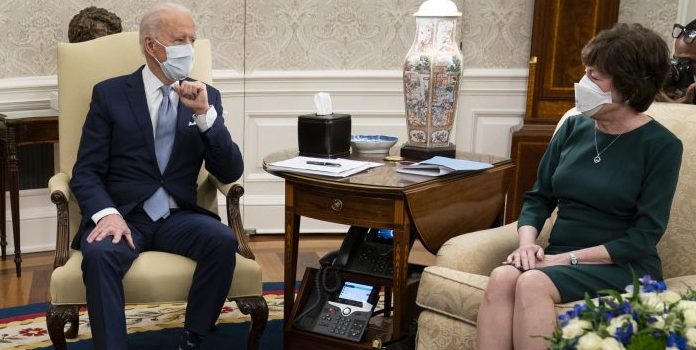(Headline USA) President Joe Biden told Republican senators during a two-hour meeting he’s unwilling to settle on an insufficient coronavirus aid package after they pitched their slimmed down $618 billion proposal that’s a fraction of the $1.9 trillion he is seeking.
No compromise was reached in the lengthy session Monday night, Biden’s first with lawmakers at the White House, and Democrats in Congress pushed ahead with groundwork for approving his COVID-19 relief plan with or without Republican votes. Despite the Republican group’s appeal for bipartisanship, as part of Biden’s efforts to unify the country, the president made it clear he won’t delay aid in hopes of winning GOP support.
White House Press Secretary Jen Psaki said that while there were areas of agreement, “the president also reiterated his view that Congress must respond boldly and urgently, and noted many areas which the Republican senators’ proposal does not address.”
She said, “He will not slow down work on this urgent crisis response, and will not settle for a package that fails to meet the moment.”
The two sides are far apart, with the Republican group of 10 senators focused primarily on the health care crisis and smaller $1,000 direct aid to Americans, and Biden leading Democrats toward a more sweeping rescue package, three times the size, to shore up households, local governments and a partly shuttered economy.
On a fast track, the goal is to have COVID-19 relief approved by March, when extra unemployment assistance and other pandemic aid expires, testing the ability of the new administration and Congress to deliver, with political risks for all sides from failure.
Republican Sen. Susan Collins of Maine called the meeting a “frank and very useful” conversation, noting that the president also filled in some details on his proposal.
“All of us are concerned about struggling families, teetering small businesses and an overwhelmed health care system,” said Collins, flanked by other senators outside the White House.
Republicans are tapping into bipartisan urgency to improve the nation’s vaccine distribution and vastly expand virus testing with $160 billion in aid. That is similar to what Biden has proposed. But from there, the two plans drastically diverge.
The GOP’s $1,000 direct payments would go to fewer households than the $1,400 Biden has proposed, and the Republicans offer only a fraction of what he wants to reopen schools.
They also would give nothing to states, money that Democrats argue is just as important, but that Republicans argue is a handout to Blue states mismanaged by Democrat governors and legislatures.
Gone are Democratic priorities such as a gradual lifting of the federal minimum wage to $15 an hour.
Wary Democrats pushed ahead at the Capitol, unwilling to take too much time in courting GOP support that may not materialize or in delivering too meager a package that they believe doesn’t address the scope of the nation’s health crisis and economic problems.
Senate Majority Leader Chuck Schumer warned that history is filled with “the costs of small thinking.”
House and Senate Democrats released a separate budget resolution Monday a step toward approving Biden’s package with a reconciliation process that wouldn’t depend on Republican support for passage.
“The cost of inaction is high and growing, and the time for decisive action is now,” Schumer and Speaker Nancy Pelosi said in a statement.
The accelerating talks came as the Congressional Budget Office delivered mixed economic forecasts Monday with robust growth expected at a 4.5% annual rate but employment rates not to return to pre-pandemic levels for several years.
The overture from the coalition of 10 GOP senators, mostly centrists, was an attempt to show that at least some in the Republican ranks want to work with Biden’s new administration, rather than simply operating as the opposition in the minority in Congress.
Asked if Biden had shown a willingness to reduce his $1.9 trillion top line, Republican Sen. Bill Cassidy of Louisiana, said, “He didn’t say that, nor did we say we’re willing to come up” from the GOP plan. He said it’s “too early” to say if a deal can be reached.
Adapted from reporting by Associated Press.

